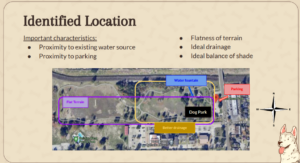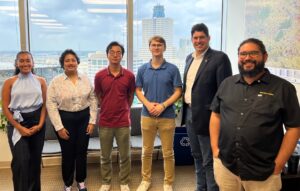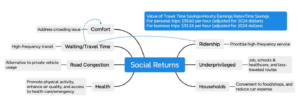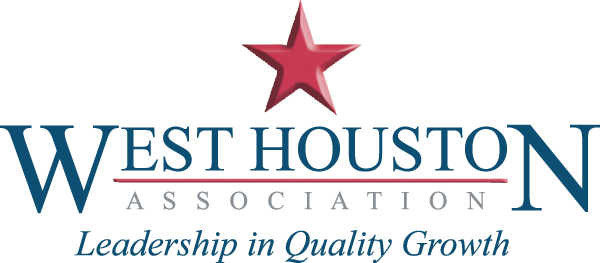This month the West Houston Association wrapped up three more projects with Rice University students as part of the Social Science Consulting Practicum. Since the collaboration started in August of 2020, WHA has worked with over 50 students across 17 real-world projects. Students in the program interact with WHA members and community partners seeking creative solutions to challenges facing the greater Houston region. These experiential learning opportunities have students engaged in research and analysis culminating in a presentation and report on their recommendations. Two of the three projects this semester specifically focused on the Alief community while the third looked at public transportation.
 The first project served as a continuation from last semester’s “A dog park for Alief” where students had identified a need for a dog park in the area and a location for its construction. This semester, Karla Vasquez and Ian Wright took the project another step further identifying how to work with the City of Houston to build the dog park in Boone Road Park and what it would cost to do so. Working with WHA member Peter Caldwell (LJA), the students created plans and cost estimates for the first public dog park in the Alief community. Barbara Quattro, Chair of the Alief Super Neighborhood Council is now working to identify funding opportunities to bring the plans to life.
The first project served as a continuation from last semester’s “A dog park for Alief” where students had identified a need for a dog park in the area and a location for its construction. This semester, Karla Vasquez and Ian Wright took the project another step further identifying how to work with the City of Houston to build the dog park in Boone Road Park and what it would cost to do so. Working with WHA member Peter Caldwell (LJA), the students created plans and cost estimates for the first public dog park in the Alief community. Barbara Quattro, Chair of the Alief Super Neighborhood Council is now working to identify funding opportunities to bring the plans to life.
“Working alongside the West Houston Association on this project was truly enriching. The opportunity to bridge classroom learning with practical applications was invaluable. Throughout the semester, we developed a variety of skills such as engaging with community stakeholders and tackling complex issues. However, the best part of this project was knowing that our work would help the Alief community in gaining access to a much needed amenity.” – Ian Wright & Karla Vasquez
 The second project that also focused on the Alief community explored an idea proposed by the Alief Independent School District to transform a no longer used city library building into a centralized family resource center. WHA member Alec Luong (Project Luong) provided insights to Rice students Maya Gerke, Stuti Jain, Maciej Koszut, and Duc Anh Nguyen on this project. Students found that a single site would not be an effective solution to the staffing and accessibility challenges the district currently faces in providing family resources and instead suggested clustering of resource centers such that a single center serves multiple schools that are already within walking distance of one another.
The second project that also focused on the Alief community explored an idea proposed by the Alief Independent School District to transform a no longer used city library building into a centralized family resource center. WHA member Alec Luong (Project Luong) provided insights to Rice students Maya Gerke, Stuti Jain, Maciej Koszut, and Duc Anh Nguyen on this project. Students found that a single site would not be an effective solution to the staffing and accessibility challenges the district currently faces in providing family resources and instead suggested clustering of resource centers such that a single center serves multiple schools that are already within walking distance of one another.
“It was an amazing opportunity to work with the West Houston Association, assessing the viability of a centralized family resource center for Alief ISD. This was not just a valuable experience, but also a meaningful step into real world problem solving and consulting dynamics.” – Maciej Koszut
 This semester’s third project continues our series of projects exploring the return on investment of sustainable infrastructure. Andrew Kim and Lenita Lyu with guidance from WHA member Michael Bloom (5engineering) took a unique approach of demonstrating triple bottom line returns from public sector investments by looking at the frequency of bus service. The highly detailed report explored looking at hard metrics for a mix of economic, social, and environmental returns and conclude that a negative nationwide trend in ridership, in part due to COVID, was the culprit for revenue losses and socially and environmentally burdensome conversions from bus to car transportation.
This semester’s third project continues our series of projects exploring the return on investment of sustainable infrastructure. Andrew Kim and Lenita Lyu with guidance from WHA member Michael Bloom (5engineering) took a unique approach of demonstrating triple bottom line returns from public sector investments by looking at the frequency of bus service. The highly detailed report explored looking at hard metrics for a mix of economic, social, and environmental returns and conclude that a negative nationwide trend in ridership, in part due to COVID, was the culprit for revenue losses and socially and environmentally burdensome conversions from bus to car transportation.
“As a student of social policy analysis, conducting research on a triple bottom line evaluation of sustainable infrastructure projects revealed to me that understanding public problems through an unconventional lens can, in turn, produce unconventional yet valuable solutions. It was rewarding to feel like a mini-expert on public transit planning considerations by the end of my semester of research for WHA.” – Andrew Kim
These projects provide students with the opportunity to develop skills in project management, research design, data analysis, and communication while learning about factors that contribute to quality growth across the greater West Houston region and beyond. “I love that we get the opportunity to connect with the next generation of leaders who will be working on community challenges that they normally might not even think about and provide an opportunity for students to engage in real-world problem solving,” explains WHA President/CEO Alan Steinberg.
Learn more about these projects and others on the WHA website as part of our Quality of Life research series.
